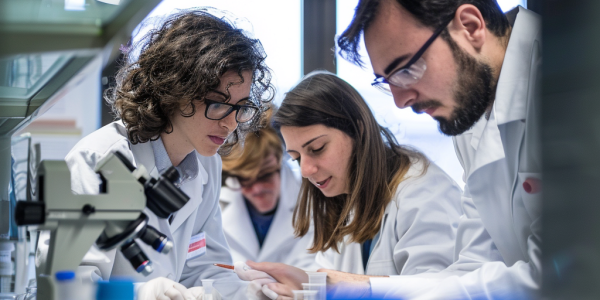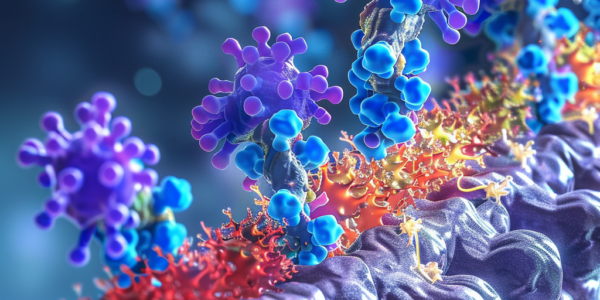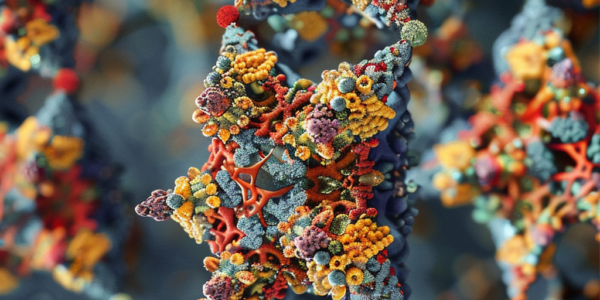Quantum-Enhanced High-Speed Camera for Molecules Developed by Scientists in Hong Kong
Discover the groundbreaking combination of quantum entangled light sources and ultrafast stimulated Raman spectroscopy in the development of a high-speed camera for molecules. Learn how this innovative technique enhances both temporal and spectral resolution in spectroscopic signals, enabling ‘high-speed imaging’ of ultrafast processes within molecular systems. Explore the significance of stimulated Raman spectroscopy in offering a more efficient alternative to traditional methods for analyzing molecular dynamics and interactions.
Groundbreaking Discovery in Gene Expression Modulation Using Small Molecules
Researchers at IIT and EMBL have made a groundbreaking discovery in gene expression modulation using small molecules, with implications for treating tumors and genetic diseases. The study, published in Nature Communications, reveals insights into how small molecules influence the splicing process, crucial for gene expression. By combining biochemistry, biophysics, and structural biology, the research team gained a detailed understanding of molecular mechanisms at play, paving the way for the development of new drugs targeting genetic mutations.
Study Reveals Pathways to Low-Temperature Formation of Pyridine and (iso)quinoline
A recent study in Nature Astronomy reveals the gas-phase formation of pyridine and (iso)quinoline through neutral-neutral reactions, shedding light on the origins of prebiotic molecules in extraterrestrial environments. Researchers identified key reactions leading to the synthesis of these aromatic molecules, offering groundbreaking insights into the formation of life-building blocks in our Galaxy.
Chemists Create Highly Reactive Chemical Compound After 120-Year Stump
Chemists at the University of Minnesota Twin Cities College of Science and Engineering have achieved a groundbreaking feat by creating a highly reactive chemical compound that has stumped scientists for over 120 years. This significant discovery opens up possibilities for new drug treatments, safer agricultural products, and enhanced electronics, as reported in Science. The breakthrough in synthesizing N-heteroarenes, despite their high reactivity, was made possible through specialized experiments conducted under controlled conditions at the University of Minnesota. This novel chemical compound holds great promise for advancements in medicine, agriculture, and technology.
Unraveling the Mysteries of Space Chemistry with Coulomb Crystals
Discover how Coulomb crystals are revolutionizing the study of interstellar chemistry in this groundbreaking research effort. By simulating ISM conditions, researchers are uncovering the mysteries of cosmic chemical evolution and shedding light on the diverse reactions occurring in the ethereal realm of interstellar space.
Study in Nature Reveals Insights into Modulation of µ-Opioid Receptor Dynamics for Pain Management Therapeutics
A recent study published in Nature has revealed insights into the modulation of conformational dynamics of the µ-opioid receptor (µOR) by ligand efficacy, offering potential for improved pain management therapeutics. The research identified various receptor conformations and their impact on G-protein binding and β-arrestin-1 interaction, shedding light on the development of safer therapeutic profiles for pain management.
Natural Protein Citrate Synthase Self-Assembles into Fractals, Study Shows
A recent study published in Nature has reported the emergence of a natural protein, citrate synthase from the cyanobacterium Synechococcus elongatus, which self-assembles into Sierpiński triangles. The research utilized cryo-electron microscopy to reveal how the fractal assembles from a hexameric building block and found that different stimuli can modulate the formation of fractal complexes. Despite the discovery, the study suggests that the fractal may not serve a physiological function in vivo, but the discovery of a natural protein self-assembling into fractals sheds light on the potential complexity and beauty of molecular-scale structures in nature.
MIT Researchers Make Groundbreaking Discovery of Neutronic Molecules
MIT researchers have made a groundbreaking discovery of ‘neutronic molecules,’ revealing that neutrons can bind to nanoscale atomic clusters known as quantum dots. This finding could offer valuable insights into material properties and quantum effects, potentially leading to the development of innovative tools for exploring quantum-level phenomena. Unlike protons and electrons, neutrons are subatomic particles that lack electric charge, making them impervious to the electromagnetic force that governs most interactions between radiation and materials. However, MIT researchers have now demonstrated that neutrons can be induced to adhere to quantum dots—comprising tens of thousands of atomic nuclei—solely through the strong force. This unexpected revelation opens up new possibilities for investigating material properties at the quantum level, particularly those stemming from the strong force, and for exploring novel forms of quantum information processing devices.
The Complexity of the Sense of Touch: Insights from Recent Study
Our bodies are equipped with an intricate sensory system that allows us to perceive the world around us. The sense of touch encompasses a combination of different sensations working in unison, as a recent study published in Science sheds light on the molecule responsible for detecting gentle touch. Understanding the mechanisms behind gentle touch sensation not only provides insights into our sensory abilities but also holds potential implications for various fields, including neurobiology and medical research.
Researchers Develop First Synthetic Molecular Motor ‘The Lawnmower’
Researchers at Simon Fraser University and Lund University have created the first synthetic molecular motor, ‘The Lawnmower,’ capable of propelling itself by harnessing the energy it generates as it cuts through fields of proteins. This groundbreaking achievement has the potential to revolutionize the treatment of various diseases and opens up new possibilities in the field of synthetic biology and molecular engineering.










